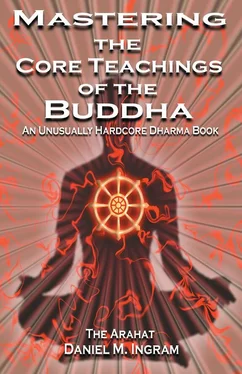Daniel Ingram - Mastering the Core Teachings of Buddha - An Unusually Hardcore Dharma Book
Здесь есть возможность читать онлайн «Daniel Ingram - Mastering the Core Teachings of Buddha - An Unusually Hardcore Dharma Book» весь текст электронной книги совершенно бесплатно (целиком полную версию без сокращений). В некоторых случаях можно слушать аудио, скачать через торрент в формате fb2 и присутствует краткое содержание. Год выпуска: 2009, ISBN: 2009, Издательство: Aeon Books, Жанр: Старинная литература, на русском языке. Описание произведения, (предисловие) а так же отзывы посетителей доступны на портале библиотеки ЛибКат.
- Название:Mastering the Core Teachings of Buddha - An Unusually Hardcore Dharma Book
- Автор:
- Издательство:Aeon Books
- Жанр:
- Год:2009
- ISBN:9781904658405
- Рейтинг книги:5 / 5. Голосов: 1
-
Избранное:Добавить в избранное
- Отзывы:
-
Ваша оценка:
- 100
- 1
- 2
- 3
- 4
- 5
Mastering the Core Teachings of Buddha - An Unusually Hardcore Dharma Book: краткое содержание, описание и аннотация
Предлагаем к чтению аннотацию, описание, краткое содержание или предисловие (зависит от того, что написал сам автор книги «Mastering the Core Teachings of Buddha - An Unusually Hardcore Dharma Book»). Если вы не нашли необходимую информацию о книге — напишите в комментариях, мы постараемся отыскать её.
Mastering the Core Teachings of Buddha - An Unusually Hardcore Dharma Book — читать онлайн бесплатно полную книгу (весь текст) целиком
Ниже представлен текст книги, разбитый по страницам. Система сохранения места последней прочитанной страницы, позволяет с удобством читать онлайн бесплатно книгу «Mastering the Core Teachings of Buddha - An Unusually Hardcore Dharma Book», без необходимости каждый раз заново искать на чём Вы остановились. Поставьте закладку, и сможете в любой момент перейти на страницу, на которой закончили чтение.
Интервал:
Закладка:
fundamental teachings of the Buddha and the second to last sentence he uttered before he died: “All phenomena are impermanent! Work out your salvation with diligence!” In his last words, he said everything you
The Three Characteristics
need to know to do insight practices. Things come and go. Nothing lasts for even an instant! Absolute transience is truly the fundamental nature of experiential reality.
What do I mean by “experiential reality?” I mean the universe of sensations that you actually experience. There are many gold standards for reality. However, when doing insight practices, the only useful gold standard for reality is your own sensate experience. From the conventional point of view, things are usually thought to be there even when you can no longer experience them, and are thus assumed with only circumstantial evidence to be somewhat stable entities.
Predictability is used to assume continuity of existence. For our day-today lives, this assumption is adequate and often very useful.
For example, you could close your eyes, put down this book, and then pick it up again where you left it without opening your eyes. From a pragmatic point of view, this book was where you left it even when you were not experiencing it in any way. However, when doing insight practices, it just happens to be much more useful to assume that things are only there when you experience them and not there when you don’t. Thus, the gold standard for reality when doing insight practices is the sensations that make up your reality in that instant. Sensations not there at that time do not exist, and thus only the sensations arising in that instant do exist. In short, the vast majority of what you usually think of as making up your universe doesn’t exist the vast majority of the time, from a pure sensate point of view. This is exactly, precisely and specifically the point. Knowing this directly leads to freedom.
It is wise to reflect on death and all of that, for it is useful and true.
This is a reflection on ordinary reality and thus an aspect of training in morality that is commonly used to develop motivation to train in insight.
Far better to see one sensation arise and pass away. What do I mean by this? I mean that sensations arise out of nothing, do their thing, and vanish utterly. Gone. Utterly gone. Then the next sensation arises, does its thing, and disappears completely. “That's the stuff of modern physics,” one might say. “What does that have to do with practice?”
It has everything to do with practice! We can experience this, because the first set of vibrations we have access to isn't actually that fast.
Vibrations. That's right, vibrations. That's what this first characteristic 17
The Three Characteristics
means: that reality vibrates, pulses, appears as discrete particles, is like TV snow, the frames of a movie, a shower of vanishing flower petals, or however you want to say it. Some people can get all into complex wave or particle models here, but don't. Just look into your actual experience, especially something nice and physical like the motion and sensations of the breath in the abdomen, the sensations of the tips of the fingers, the lips, the bridge of the nose, or whatever. Instant by instant try to know when the actual physical sensations are there and when they aren't. It turns out they aren't there a good bit of the time, and even when they are there, they are changing constantly.
We are typically quite sloppy about what are physical sensations and what are mental sensations (memories, mental images, and mental impressions of other sensations). These two kinds of sensations actually oscillate back and forth, a back and forth interplay, one arising and passing and then the other arising and passing, in a somewhat quick but quite penetrable fashion. Being clear about exactly when the physical sensations are there will begin to clarify their slippery counterpart that helps create the illusion of continuity or solidity: flickering mental impressions.
Coming directly after a physical sensation arises and passes is a separate pulse of reality that is the mental knowing of that physical sensation, here referred to as “consciousness” (as contrasted with
“awareness” in Part III). By physical sensations I mean the five senses of touch, taste, hearing, seeing, and smelling. This is the way the mind operates on phenomena that are no longer there, even thoughts, intentions and mental images.
Since I just used this dangerous phrase “the mind,” I should quickly mention that it cannot be found. I’m certainly not talking about the brain, which we have never experienced, as the standard for insight practices is what we can directly experience. As an old Zen monk once said to us in his extremely thick Japanese accent, “Some people say there is mind. I say there is no mind, but never mind. Heh, heh, heh!”
However, I will use this dangerous phrase “the mind” often, or even worse “our mind,” but think to yourself when you read it, “He’s just using conventional language, but really there are just utterly transient mental sensations. Truly, there is no stable entity called ‘the mind’
18
The Three Characteristics
which can be found! By doing insight practices, I will fully understand this!” If you are able to do this, we’ll get along just fine.
This mental impression of a previous sensation (often called
“consciousness” in Buddhist parlance) is like an echo, a resonance. The mind takes a crude impression of the object, and that is what we can think about, remember and process. Then there may be a thought or an image that arises and passes, and then, if the mind is stable, another physical pulse.
Each one of these arises and vanishes completely before the other begins, so it is extremely possible to sort out which is which with a stable mind dedicated to consistent precision and to not being lost in stories.
This means that the instant you have experienced something, you know that it isn't there any more, and whatever is there is a new sensation that will be gone in an instant. There are typically many other impermanent sensations and impressions interspersed with these, but, for the sake of practice, this is close enough to what is happening to be a good working model.
Engage with the preceding paragraphs. They are the stuff upon which great insight practice is based. Given that you know sensations are vibrating, pulsing in and out of reality, and that, for the sake of practice, every sensation is followed directly by a mental impression, you now know exactly what you are looking for. You have a clear standard. If you are not experiencing it, then stabilize the mind further, and be clearer about exactly when and where there are physical sensations. Spend time with this, as long as it takes. The whole goal is to experience impermanence directly, i.e. things flickering, and what those things are doesn't actually matter one bit!
How freeing! Interpretation is particularly useless in insight meditation, so you don't have to spend time doing it when you are on the cushion. Throughout this book I recommend reflecting on spiritual teachings and how to bring them to bear on our life, but not on the cushion. Thoughts, even supposedly good ones, are just too slippery and seductive most of the time, even for advanced meditators, though if you can avoid getting lost in their content they are as valid a stream of objects as any other. Try to limit yourself to a few minutes of reflection 19
The Three Characteristics
per hour of meditation. This should be more than enough. There are simply no substitutes for this sort of momentum in practice.
How fast are things vibrating? How many sensations arise and vanish each second? This is exactly what you are trying to experience, but some very general guidelines can provide faith that it can be done and perhaps point the way as well. Begin by assuming that we are talking about one to ten times per second in the beginning. This is not actually that fast. Try tapping five to ten times per second on a table or something. It might take two hands, but it's manageable, isn't it? You could obviously experience that, couldn't you? That's the spirit!
Читать дальшеИнтервал:
Закладка:
Похожие книги на «Mastering the Core Teachings of Buddha - An Unusually Hardcore Dharma Book»
Представляем Вашему вниманию похожие книги на «Mastering the Core Teachings of Buddha - An Unusually Hardcore Dharma Book» списком для выбора. Мы отобрали схожую по названию и смыслу литературу в надежде предоставить читателям больше вариантов отыскать новые, интересные, ещё непрочитанные произведения.
Обсуждение, отзывы о книге «Mastering the Core Teachings of Buddha - An Unusually Hardcore Dharma Book» и просто собственные мнения читателей. Оставьте ваши комментарии, напишите, что Вы думаете о произведении, его смысле или главных героях. Укажите что конкретно понравилось, а что нет, и почему Вы так считаете.












